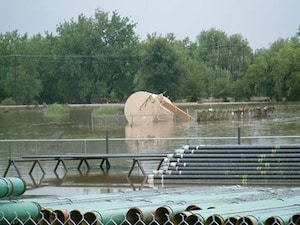This is a guest post by Alisha Mims, cross-posted from Ring of Fire.
As the devastating flooding in Colorado continues, some Colorado residents are wondering why no one is talking about flooded oil and gas wells from fracking. According to several reports and photographs from Coloradans, oil and gas tanks are tilted and, in some cases, overturned. Residents are deeply concerned about potential contamination.
Residents have been posting photos of the flooded condensate tanks, which hold fracking wastewater, on Facebook, as well as sending testimonies and pictures to the drilling reform-awareness blog, Bluedaze, created by TXsharon. One Colorado resident sent this e-mail to Bluedaze:
I see you’ve noticed the underwater wells in Weld County, Colorado. Amazing; we’ve emailed the Denver TV stations, other media, and state and local politicians. We’ve sent pictures that our members have taken. It’s like the media and politicians have been TOLD not to say anything about it. There has been no mention of the gas wells on the Denver newscasts either last night or this evening although all stations have had extensive and extended flood coverage. You can see underwater wells in the background of some of the newscast videos, and yet the reporters say absolutely nothing.
Here’s a picture one of our members took yesterday in Weld County, Colorado. We’ve got tons more on our website. Check it out. The tanks are tipping and, in some cases, have fallen over. They have to be leaking toxins into the flood waters. There have to be hundreds if not thousands of underwater well pads in Weld County as a result of the flooding.
Source: East Boulder County United via Facebook
Boulder, Colorado news site, the Daily Camera, reports that Colorado Oil and Gas Association President Tisha Schuller said industry officials are monitoring the effects of the flooding. A spokesman for the Colorado Oil and Gas Conservation Commission said his agency is aware of the “potential for contamination,” but that there is no way to access flooded drilling sites at this time.
According to the Daily Camera, northeast Boulder County and southwest Weld County are inundated with thousands of oil and gas wells and “associated condensate tanks and ponds.” Industry officials have said that many operators “shut in” or closed down well operations in preparation for the flooding.
A spokesman for the Department of Natural resources asserted that many operators also added “security” to tanks, such as chains to prevent them from floating away. Yet aerial photographs have reportedly shown “floating and drifting” tanks in some areas.
Andrew Barth, a city spokesman with the Boulder Office of Emergency Management said that local officials are “well aware of the potential problems from drilling wells,” but that they will have to wait to address the issue until the flooding subsides and resources that are currently focused on the “immediate threat to life” can be allocated.
“We’ve seen those same pictures, and we are concerned,” Barth told the Daily Camera. “We are going to go out and look at those once we’re out of the immediate search and rescue phase.”
Fracking activist Cliff Willmeng spent two days documenting flooded drilling sites in Weld and Boulder counties. He reportedly saw “hundreds” of swamped wells and many condensate tanks tipped at odd angles and overturned.
“It’s clear that the density of the oil and gas there did not respect where the water would go,” he said. “This is washing across agricultural land into the waterways. Now we have to discuss what type of exposure the human population is going to have to suffer through.”
Willmeng and other activists believe the first step in addressing the issue is for drilling companies to release a detailed report of exactly what is leaking from the tanks. As has been the experience with the secretive fracking industry in the past, it will likely prove difficult, if not impossible, to get companies to release such information.
Source: Frack Files via Facebook
Source: Cliff Willmeng via the Daily Camera
Source: Cliff Willmeng via the Daily Camera
Alisha is a writer and researcher with Ring of Fire. Follow her on Twitter @childoftheearth.
Subscribe to our newsletter
Stay up to date with DeSmog news and alerts











